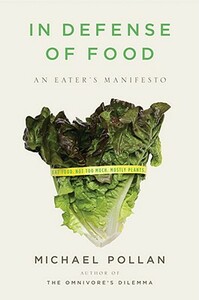Take a photo of a barcode or cover
"Eating with the fullest pleasure – pleasure, that is, that does not depend on ignorance – is perhaps the profoundest enactment of our connection with the world. In this pleasure we experience and celebrate our dependence and our gratitude, for we are living from mystery, from creatures we did not make and powers we cannot comprehend."
- Wendell Berry
Readable and thought-provoking, but too short to really address everything Pollan brings up. I like how he lays out the history of our understanding nutrients, from the isolation of the Big Three -- protein, fat, and carbohydrates -- to the addition of vitamins and minerals, essential fatty acids, and antioxidants. Scientists at each stage were confident they had the whole picture and could now reproduce the health benefits of whole foods in the laboratory. But it seems we still don't have the whole picture. Food is really complicated, and evolutionary webs are harder to synthesize than folic acid or beta-carotene.
There are some obvious gaps in the book, mostly where Pollan is trying not to repeat sections of Omnivore's Dilemma, and some spots where I want him to take the dive into science -- overall, I'd say "manifesto" is accurate: Pollan makes statements about things, they sound really good, and they make me hungry for some leafy greens.
- Wendell Berry
Readable and thought-provoking, but too short to really address everything Pollan brings up. I like how he lays out the history of our understanding nutrients, from the isolation of the Big Three -- protein, fat, and carbohydrates -- to the addition of vitamins and minerals, essential fatty acids, and antioxidants. Scientists at each stage were confident they had the whole picture and could now reproduce the health benefits of whole foods in the laboratory. But it seems we still don't have the whole picture. Food is really complicated, and evolutionary webs are harder to synthesize than folic acid or beta-carotene.
There are some obvious gaps in the book, mostly where Pollan is trying not to repeat sections of Omnivore's Dilemma, and some spots where I want him to take the dive into science -- overall, I'd say "manifesto" is accurate: Pollan makes statements about things, they sound really good, and they make me hungry for some leafy greens.
informative
inspiring
reflective
medium-paced
A better length than his last. I had issues with the demonetization of both food scientists and the health care industry. I think they are all just trying to help and overwhelmed with the scope of the issues. But his conclusions were all otherwise sound. Hmm, do I even know how my ancestors ate?
could've been summed up in one paragraph. didn't like all the scientific mumbo jumbo. i've read better books on food...hoping his other one lives up to the hype.
This is a pretty good look at the differences between "food" and "nutrition," especially with regards to the nutrition science that drives the Western diet today. The author presents lots of good information in a concise way, and while his agenda is clear he does a good job of not being "in-your-face" about it. I'm definitely inspired to continue my quest to minimize overly packaged goods in my diet.
informative
medium-paced
Eat food. Not too much. Mostly plants. Pretty sound advice and overall a good reminder to think about what I'm putting in my body.
The premise is absolutely on point. I didn't think anything presented in this book was wrong. But, good lord Mr. Pollan, this was DRY. I found it very hard to concentrate on the dry details and, for a book that is downplaying the science of nutritionism, you sure talked a LOT about the science of nutritionism. I don't disagree with the thesis, but the book itself was just too long and too dry.
Unbelievable!! This is a must read for anyone who is concerned with what to eat.
Pollan argues that food should be natural and enjoyed, something that seems common sense and easy at first. Nevertheless, he explains how Western societies have moved away from the basics of eating and discusses the effects of this phenomenon. Pollan provides thorough research to back up his viewpoints and makes a compelling case for going back to traditional diets.




